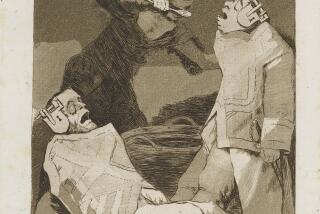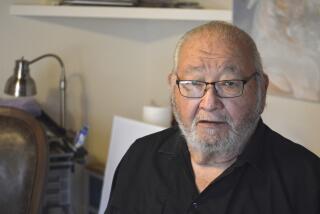On Translating Montale
- Share via
Outside the elevator at the Manhattan offices of Farrar, Straus and Giroux, a glass case is filled with books showcasing the recent publishing season--poetry by Seamus Heaney; a collection of essays by Derek Walcott; Tom Wolfe’s new novel; a young adult novel, “Flapjack”; and a bilingual edition of the poems of Eugenio Montale.
His name spreads across the top of the dust jacket in pale yellow lettering starkly set against a black background. The translator’s name, Jonathan Galassi, appears discreetly across the bottom. Galassi is editor in chief of Farrar, Straus and Giroux, and this collection, 626 pages, the first half of Montale’s creative life, represents 14 years of work. Montale, who died in 1981, wrote lyrically compact poems that place him squarely in the ascetic modernist tradition, often both revelatory and oblique in the same line.
Galassi, of Italian descent by way of Seattle, came to Montale through his own Italian roots and Robert Lowell, with whom he studied at Harvard. Lowell had written some versions of Montale.
“I don’t know if you could call them exactly translations,” Galassi said, “because his imitations were a little looser. . . . There is a kind of grandeur to Lowell’s style that sort of fit with an aspect of Montale, and yet I felt that Montale’s poetry actually had . . . held up in some ways better than Lowell’s sometimes did.”
“Collected Poems” is Galassi’s third translation of Montale. The first, published in 1982, “The Second Life of Art,” contains Montale’s scholarly yet intimate essays about writers and artists. The second, “Otherwise,” published in 1984, contains both early poems and the later poems, written in a more diaristic style. The new collection contains an essay plus about 200 pages of notes. In addition, he’s edited a magazine issue devoted to Montale and concedes Montale’s influence on his own work. Galassi himself is a published poet.
Galassi revises some of his translations over and over again, but when words like “obsession” or “fixation” are proposed, he doesn’t like them. “Obsession. . ,” Galassi wonders, searching for a way to describe this passion: “It’s been a very long engagement. Or devotion. I was very drawn to his frame of mind. I think I was drawn to his skepticism, combined with his very deep will to believe. He is a believer who can’t really find the reasons to believe. And his poetry has great, great linguistic richness. Instead of sweeping away the past or being slavish to it, he appropriates it in a very masterful way. It is a very special kind of poetry. He took me over in some way.”
As a graduate student, Galassi studied Italian at Perugia in Italy, and poet Frank Bidart suggested that he translate a series of poems Montale had written around the time his wife died, the so-called “Xenia” poems.
“I think Frost was the one who said that the poetry is lost to translation. Sometimes, I do believe that,” Galassi said. “I try to make poems in English that are accurate representations of the base level of the poem, but give something else to it.”
Galassi has a lot of company in his translations of Montale. The most prolific, who managed to be both elegant and adventurous, was William Arrowsmith, whose estate continues to release editions of his work. Galassi knew Arrowsmith and cites his debt to him repeatedly in his notes, while also thanking other poets, translators and critics.
“A translator never knows if he’s getting it. How do you know that you’re reading Montale the way his own readers are reading him? Why do translation? What are you carrying across? For me, it is a very paradoxical exercise to try to create poems that are tied down at two or three corners by someone else’s meaning and their language.”
Contrast the work of Arrowsmith and Galassi, and you discover how individual this exercise is. In the poem “On the Threshold” from “Cuttlefish Bones,” Arrowsmith translates Montale’s imaginary landscape by writing: “ . . . here are tales composed and deeds / annulled, for the future to enact.” Galassi, writing nearly a generation later, conveys Montale’s line this way: “. . . histories are shaped here, deeds / the endgame of the future will dismantle.”
Galassi is asked if the “endgame” refers to Samuel Beckett’s 1957 play, whose bleak Vaudeville also takes place in an undefined threshold between past and future. “Yes, that was a definite insertion on my part,” Galassi says. In fact, Beckett translated Montale.
Galassi suggests that translation can reflect, as modern poetry so often does, an intellectual search whose intensity borders on the religious. “Human beings are always postulating about divinity, about teleology,” he said. “That’s all they can do. They can’t break the veil, and the veil of translation is the same thing, in a way, because you can’t break through.”
More to Read
Sign up for our Book Club newsletter
Get the latest news, events and more from the Los Angeles Times Book Club, and help us get L.A. reading and talking.
You may occasionally receive promotional content from the Los Angeles Times.






